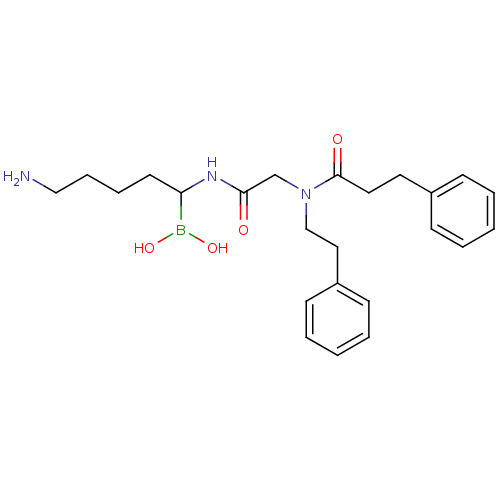

 Search and Browse
Search and Browse
 Download
Download
 Enter Data
Enter Data
BDBM50069924 Boropeptide analogue::CHEMBL419734
SMILES: NCCCCC(NC(=O)CN(CCc1ccccc1)C(=O)CCc1ccccc1)B(O)O
InChI Key: InChIKey=FVEMXCSGNPVPIT-UHFFFAOYSA-N
Data: 2 KI
| Target/Host (Institution) | Ligand | Target/Host Links | Ligand Links | Trg + Lig Links | Ki nM | ΔG° kcal/mole | IC50 nM | Kd nM | EC50/IC50 nM | koff s-1 | kon M-1s-1 | pH | Temp °C |
|---|---|---|---|---|---|---|---|---|---|---|---|---|---|
| Prothrombin (Homo sapiens (Human)) | BDBM50069924 (Boropeptide analogue | CHEMBL419734) | PDB UniProtKB/SwissProt antibodypedia GoogleScholar AffyNet | CHEMBL PC cid PC sid UniChem Similars | PubMed | 0.420 | n/a | n/a | n/a | n/a | n/a | n/a | n/a | n/a |
DuPont Merck Pharmaceutical Company Curated by ChEMBL | Assay Description Binding affinity towards thrombin was tested. | Bioorg Med Chem Lett 8: 301-6 (1999) BindingDB Entry DOI: 10.7270/Q2542MRM | |||||||||||
| More data for this Ligand-Target Pair | |||||||||||||
| Coagulation factor X (Homo sapiens (Human)) | BDBM50069924 (Boropeptide analogue | CHEMBL419734) | PDB MMDB Reactome pathway KEGG UniProtKB/SwissProt UniProtKB/TrEMBL B.MOAD DrugBank antibodypedia GoogleScholar AffyNet | CHEMBL PC cid PC sid UniChem Similars | PubMed | 130 | n/a | n/a | n/a | n/a | n/a | n/a | n/a | n/a |
DuPont Merck Pharmaceutical Company Curated by ChEMBL | Assay Description Binding affinity towards complement factor Xa. | Bioorg Med Chem Lett 8: 301-6 (1999) BindingDB Entry DOI: 10.7270/Q2542MRM | |||||||||||
| More data for this Ligand-Target Pair | |||||||||||||